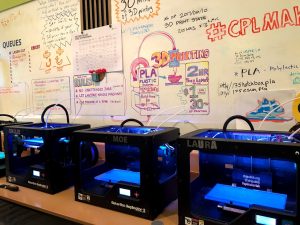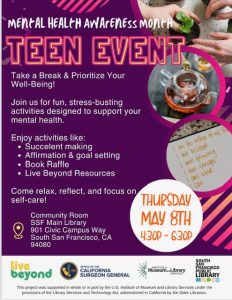In this module, Professor Michael Stephens coaches us to look across sectors—to look beyond libraries. Stephens (2019) also reminds us to dream:
Have you had the chance to dream at your library job? Have you had the opportunity to stop for a minute in the buzz of your routine and think about the future? Are you encouraged to innovate?
If not, then I urge you to do so. Also, I urge library administrators to encourage dreaming on the job. Formalize it—call your innovation group “Dreamers,” or use the more-grounded moniker “Emerging Technology Committee. (p.11)
This notion reminded me of a book my husband brought home after returning from work. One of his peers handed out books as gifts to everyone at the company event that day. The title was Unreasonable Hospitality: The Remarkable Power of Giving People More Than They Expect. The author, Will Guidara, describes magical moments, or gifts, his restaurant creates for his guests. At his restaurant, Eleven Madison Park (EMP), they even have a job title for this role: Dreamweaver.
What Does This Mean for Libraries?
In this article, Do We Need Libraries?, the author points out “five questions that could lead to the right answer. In fact, the key to unlocking the mystery requires asking the right questions”
- How can we delight our users and customers?
- How can libraries manage to enable continuous innovation?
- What will make things better, faster, cheaper, more mobile, more convenient or more personalized for users?
- What needs could libraries meet that users haven’t yet even thought of?
- What are the things that libraries are currently doing that users already love?
Streams of Consciousness
Every morning, I go out to my driveway to grab my newspaper so I can read it with my cup of coffee. On March 16, the Chronicle’s headline read: San Francisco Bay Area counties issue shelter-in-place order | AP News. Being on lockdown was a good time to write down my thoughts. Starting on day 1, I kept a journal of the weeks since my library announced suspended walk-in service. Behind the scenes, staff were at home—working remotely and communicating virtually.
My journal entries serve as evidence of how public libraries adapted in a fast-moving, user-experience-driven environment. We experienced this transformational shift first-hand. To stay connected, informed, and engaged, our city organized regular staff town hall meetings.
The library pivoted quickly and expanded its virtual offerings. Patrons could apply for an online library card and join virtual story time. I led several Kids Coding programs! New services included book-by-mail (including DVDs and other audiovisual materials), curbside pickup, and computer lab appointments for essential tasks such as applying for unemployment, preparing résumés, or searching for jobs. These were declared essential services by our city.
We expanded online access and digital offerings. The California State Library awarded us a $190,143 grant for an after-school program, a $2,500 grant for a pop-up lunch program, and $254million in grants for free online tutoring via Brainfuse for all Californians.
On our health and well-being, library staff socialized on ZOOM—we created art and knitted together. We also had access to free educational classes through the California State Library; I took classes in Speed Spanish and Edible Gardens.
Lessons I learned from lockdown: Libraries are not just about books; they are about people and participatory engagement.
Moving from Lockdown and Thinking Out Loud:
How can we delight our users?
- Comparing notes from EMP’s playbook, library staff make efforts to remember past events, patrons’ names, and interests.
- Trendspotting/new design models: Makerspaces, collaboration rooms, coffee and vending machines, and atmospheres of belonging. In our youth library, we play lo-fi music in the background to create a vibe. And in 2019, I visited the Harold Washington Library Center in Chicago to check out their Innovation Lab (photo below).

3D printers @ Harold Washington Library Center, Chicago Public Library (June 17, 2019)
How can libraries manage to enable continuous innovation?
- Form ad-hoc teams and encourage staff to experiment! Guidara advises, “Tap into their passions—then give them the keys”. Also, Mathews (2012) stresses that in facing the future, we don’t just need change, we need breakthrough, paradigm-shifting, transformative disruptive ideas: Build, Measure, Learn and “build this continuous feedback loop into your process” (p. 6).
- Build partnerships. Partner with local high schools to engage Young Adults in STEM programming. Here is a flyer from a recent program with the State of California:

SSFPL and Live Beyond partnership programming
What will make things better, faster, cheaper, more mobile, more convenient or more personalized for users?
- Needs-based programming, human-centered signage and space, quick-picks, staff-picks, expanded lending (e.g., musical instruments, laptops, tools, seeds, Discover & Go museum passes, eBooks, streaming videos), mobile apps (e.g., push notifications for holds and events).
What needs could libraries meet that users haven’t yet even thought of?
- In INFO240, I worked on a program idea: Personal Information Management (PIM). With the future of PIM becoming increasingly automated, privacy and data ownership must remain a central focus. How do we manage our emails, digital files, and calendars to bookmarks and paper documents in the future? I’ve been wondering about how our library will build programming to address this gap.
What are the things that libraries are currently doing that users already love?
- Listening. Community imagination. Trusted advisors of credible information. Digital lifelines. Guidara’s secret says it all: “It feels great to make other people feel good.”
The next chapter: Post-COVID
In October 2023, my library physically moved into a brand-new building. In our new space we have a Discovery Center that includes a Makerspace, a Digital Media Lab, and a Community Room. The call to action in the next chapter will be how to navigate what’s on the horizon: AI.
References:
Guidara, W. (2022). Unreasonable hospitality: The remarkable power of giving people more than they expect. Optimism Press
StephensWholehearted.pdf—Adobe cloud storage. (n.d.). Retrieved July 25, 2025, from https://acrobat.adobe.com/id/urn:aaid:sc:VA6C2:dbd29840-0652-4978-bf1a-40513651ee20/?filetype=application%2Fpdf
Mathews, B. (2012). Think Like A Startup: a white paper to inspire library entrepreneurialism.
